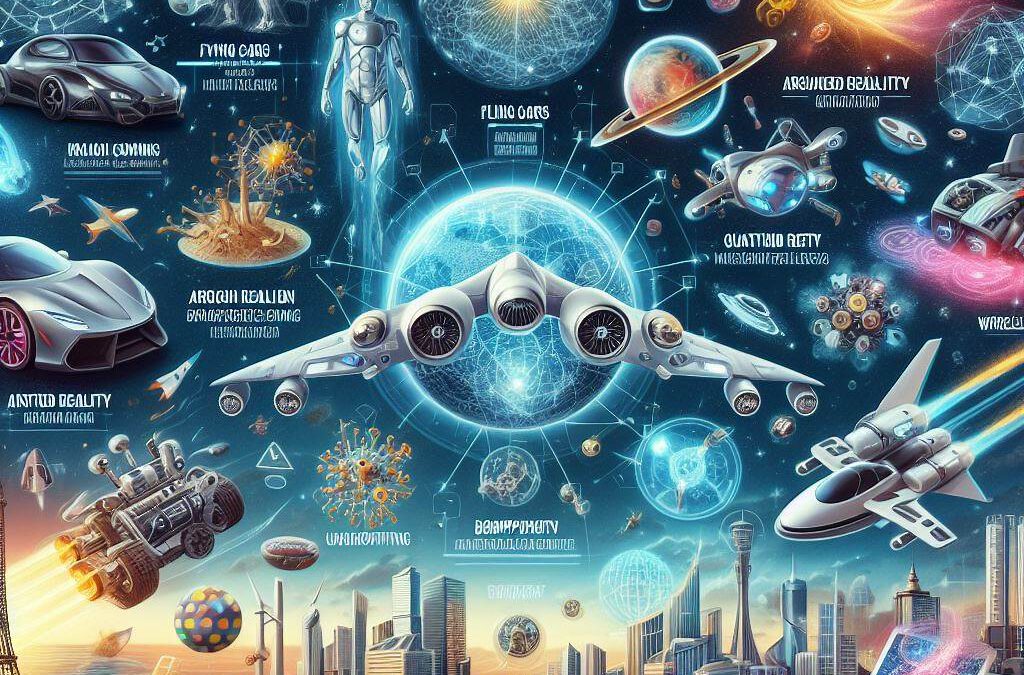
The Top 10 Future Technologies That Will Change The World
Technology is changing the world at an unprecedented pace, and we are witnessing the emergence of new and exciting innovations that will shape our future. In this post, we will explore the top 10 future technologies that are attracting the attention and investment of scientists, entrepreneurs, and governments. These technologies have the potential to transform various aspects of our lives, from health and education to energy and entertainment. They also pose significant challenges and opportunities for society, economy, and environment. This post is brought to you by The Trendsetters, your source travel, luxury and technology.

1. Quantum Computing
Quantum computing is a new paradigm of computing that leverages the principles of quantum physics to perform operations that are impossible or impractical for classical computers. Quantum computers use quantum bits or qubits, which can exist in superposition of two states, 0 and 1, at the same time. This allows quantum computers to process massive amounts of data and solve complex problems faster and more efficiently than classical computers. Quantum computing has applications in various fields, such as cryptography, artificial intelligence, drug discovery, and optimization[^1^][1].
2. Augmented Reality
Augmented reality is a technology that enhances our perception of reality by overlaying digital information and images onto our physical environment. Augmented reality can be experienced through devices such as smartphones, tablets, glasses, or headsets, which use cameras, sensors, and software to create immersive and interactive experiences. Augmented reality has applications in various domains, such as education, entertainment, tourism, and gaming[^2^][2].
3. 3D Printing
3D printing is a technology that creates physical objects from digital models by depositing layers of material on top of each other. 3D printing can produce complex and customized shapes that are difficult or impossible to make with traditional methods. 3D printing can also reduce waste, cost, and time, as well as enable innovation and personalization. 3D printing has applications in various sectors, such as manufacturing, healthcare, architecture, and art[^3^][3].
4. Internet of Things
Internet of Things is a technology that connects physical devices, such as sensors, appliances, vehicles, and machines, to the internet and to each other. Internet of Things enables data collection, analysis, and communication, as well as automation and remote control. Internet of Things can improve efficiency, productivity, safety, and convenience, as well as create new business models and services. Internet of Things has applications in various industries, such as agriculture, energy, transportation, and smart cities.
5. Artificial Intelligence
Artificial intelligence is a technology that enables machines to perform tasks that normally require human intelligence, such as reasoning, learning, decision making, and natural language processing. Artificial intelligence can augment or replace human capabilities, as well as create new ones. Artificial intelligence can also generate insights, predictions, and recommendations, as well as optimize processes and systems. Artificial intelligence has applications in various domains, such as healthcare, finance, education, and entertainment.
6. Gene Editing
Gene editing is a technology that allows modifying the DNA of living organisms, such as plants, animals, and humans. Gene editing can add, remove, or change specific genes, as well as correct genetic defects or enhance desired traits. Gene editing can also create new varieties of organisms, as well as edit the microbiome, which is the collection of microorganisms that live in and on our bodies. Gene editing has applications in various fields, such as biotechnology, agriculture, medicine, and bioengineering.
7. Renewable Energy
Renewable energy is a technology that generates electricity from natural and inexhaustible sources, such as solar, wind, hydro, geothermal, and biomass. Renewable energy can reduce greenhouse gas emissions, as well as dependence on fossil fuels, which are finite and polluting. Renewable energy can also increase energy security, access, and affordability, as well as create jobs and economic growth. Renewable energy has applications in various sectors, such as power, transportation, heating, and cooling.
8. Autonomous Vehicles
Autonomous vehicles are a technology that enables vehicles to drive themselves without human intervention, using sensors, cameras, and software to perceive and navigate the environment. Autonomous vehicles can improve safety, efficiency, and convenience, as well as reduce traffic congestion, pollution, and fuel consumption. Autonomous vehicles can also enable new modes of mobility, such as ride-sharing, ride-hailing, and delivery services. Autonomous vehicles have applications in various domains, such as personal, public, and commercial transportation.
9. Nanotechnology
Nanotechnology is a technology that manipulates matter at the nanoscale, which is about 1 to 100 nanometers, or a billionth of a meter. Nanotechnology can create new materials, devices, and systems, with novel properties and functions, such as strength, conductivity, and reactivity. Nanotechnology can also enable precise and targeted delivery, as well as integration and interaction, of matter at the molecular level. Nanotechnology has applications in various fields, such as electronics, medicine, energy, and environment.
10. 5G and Beyond
5G and beyond are technologies that enable the next generation of wireless communication, which will offer faster speed, higher capacity, lower latency, and more reliability than the current 4G networks. 5G and beyond will also support new types of devices, such as wearables, drones, and robots, as well as new applications, such as virtual reality, augmented reality, and cloud computing. 5G and beyond will also enable the convergence and integration of other technologies, such as artificial intelligence, internet of things, and quantum computing.
Conclusion
These are the top 10 future technologies that will shape the coming decade, according to McKinsey. These technologies will have a profound impact on our lives, as well as on the world around us. They will also create new opportunities and challenges for individuals, organizations, and societies. To learn more about these technologies and how to leverage them, visit our website, thetrendsetters.nl, where we provide you with the latest news, insights, and analysis on the future of technology.
